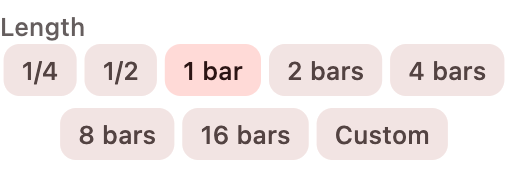Matrix recording settings
You will see this when selecting the Matrix cell  .
.
Basics ⊖
Looped

If this is enabled, a clip will immediately start playing after it has been recorded, and it will be looped.
If disabled, the clip will be stopped after its recording, and it will be a One shot.
Allow tempo detection recording

If this is enabled, recording a clip will initiate a tempo detection recording when playback is stopped and the metronome is off.
If disabled, it will initiate a count-in recording instead.
MIDI ⊖
Detect downbeat

If you enable this, Playtime will record even MIDI notes that you play before the scheduled recording start (e.g. before the next bar). It will interpret those notes as pickup beat and adjust the downbeat setting accordingly.
See Downbeat.
Auto-quantize

If you enable this, Playtime will automatically quantize a newly recorded MIDI clip after it has been recorded. It will do so using the global matrix quantization grid setting.
See Quantize  and MIDI quantization grid.
and MIDI quantization grid.
Settings for new clips ⊖
Sync to project tempo

Set whether playback of the recorded clip (after its recording) should synchronize to the project tempo.
Auto
Derives this option automatically from the start timing.
Example: If the recording start timing was quantized, it will choose to synchronize to the project tempo. If it was "Immediately", it will not.
MIDI reset behavior
MIDI reset behavior that will be assigned to new clips: Recorded clips, imported clips and empty clips created by double-clicking a slot.
See Reset behavior.
Tempo detection range

This influences how Playtime detects the tempo of imported or recorded audio material.
Playtime uses tempo detection if you import an audio clip or if you do tempo detection recordings. It derives the tempo from the length of the material, which should always give an accurate result if the material is already cut. However, it can easily happen that Playtime detects half-time or double-time tempos. This might result in clip playback being half or twice as fast as you want. By restricting the tempo detection range, you can improve the results.
Playtime might detect that imported audio material has the following valid tempos: 30bpm, 60bpm, 120bpm, 240 bpm. By setting the tempo detection range to 80bpm - 180bpm, Playtime will for sure pick 120bpm.




